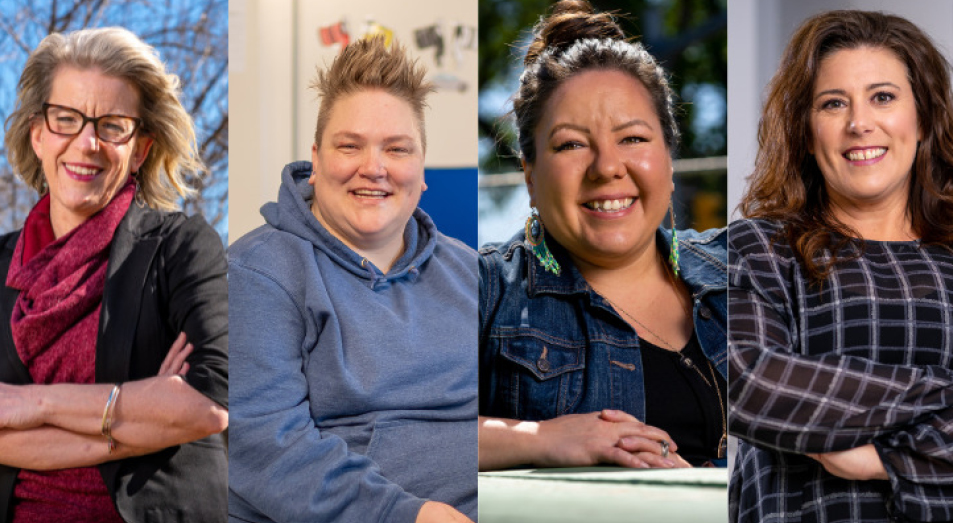
Growing Field of Early Childhood Education Provides Diverse and Exciting Opportunities for Alumni
Practical experience and the latest research challenges and prepares students for careers in ECE
The growing field of Early Childhood Education (ECE) is full of opportunities to make a difference in early learning and preparing children for future success. Amanda Bull, Victoria Hopkins, Tanya Mazurek and Carmelle Ottenbreit, alumni of the Saskatchewan Polytechnic Early Childhood Education diploma program, have pursued different areas within the ECE field and say their training at Sask Polytech had a major impact on their career success.
“You never know where this education can take you, there are so many ways to make a difference in children’s lives,” says Carmelle Ottenbreit. Ottenbreit graduated from the ECE diploma program in 1996 and has accepted new and challenging opportunities throughout her career, including working as a child care consultant with the Government of Saskatchewan Ministry of Education. “I never thought I would have the skills to work with children with diverse needs or manage a centre, but Sask Polytech gave me the skills I needed. I’ve had the opportunity to grow and gain experience in both areas,” she says.
Preparing students for the variety of work in ECE is an integral part of the Sask Polytech program. Saskatoon campus features the Early Childhood Education Demonstration Centre, a licensed child care centre and demonstration program that is utilized for all ECE courses. The demonstration centre provides students with hands-on learning opportunities, allowing them to gain practical experience working with young children in a real-world setting. Students use observation booths to observe children, behaviour and the work environment. They also interact with the children as a part of course work.
“Our ECE program has an important advantage, we’re fortunate that three of our campuses have an on-site licensed child care facility. These provide opportunities for students to work directly with children, observe educators demonstrating good practice and work in environments that provide children and families with rich, learning and care experiences,” says program head Shauna Coons. In addition to Saskatoon’s demonstration centre, Prince Albert and Regina campuses also have on-site daycares that help students gain experience through observations, interaction and practicums. Students participate in four practicums during their studies.
Victoria Hopkins found the perfect career fit during a practicum at Hope’s Home and since graduating in 2009 has had multiple roles with the organization including early childhood educator development worker, recreation programmer and is currently the early learning and childcare manager of the Warman location. “Thirteen years later and I couldn’t imagine doing anything else. I love teaching, leading, supporting and coaching other educators to create amazing educational opportunities for their classrooms and children,” says Hopkins.
Despite taking their program through Sask Polytech at different times over the last 30 years, each alumnus noted that small class sizes, fun and engaging content and instructors who invest in the success of their students by mentoring and challenging them, provided an exceptional educational experience. Amanda Bull even credits some of her work styles to her instructors. “The skill level and professionalism of my former instructors set the bar for how I want my program to run.” Bull says she learned mentorship skills from her instructors including how to ask thought provoking and tough questions, and to teach with passion, emotion and excitement. Bull runs the Aboriginal Head Start Program where she hires and mentors staff. “I am currently living my dream job,” she says.
Tanya Mazurek also has a strong appreciation for the training she received at Sask Polytech. “The incredible instructors inspired me towards best practice and instilled that this is one of the most important jobs on earth.” Mazurek’s goal was to become a director at a childcare facility. “I did a director’s practicum as my last placement and became a director within one year of graduating,” she says. Her career has since evolved and she is now an independent early learning consultant and professional speaker. Mazurek speaks on topics related to early learning, facilitates workshops, develops training, provides mentorship and supports early learning programs to break down barriers.
As the Government of Saskatchewan moves to bring down average fees for regulated child care to $10-a-day and add 28,000 licensed child spaces by 2026, certified early childhood educators are in high demand. Mazurek encourages those interested in pursuing ECE to take control of their future. “Make your dreams come true. Having a good foundation and education before you begin the journey will lead to ongoing success and growth in the future,” she adds.
As is evident from the wealth of career experiences these ECE alumni have gained, the ECE field offers many career options including working in an early learning and child care centre as a frontline educator or director, working with children with diverse needs, owning and operating a day home, working as a child care consultant, working in a preschool or elementary school, or with a Kids First or Aboriginal Head Start program.
“ECE has come a long way and it can keep expanding to meet children where they are at and work to make the world a better place,” says Ottenbreit. “The early years are so vital and set children up for so many impactful positive life experiences. Children can teach us so much; we just need to be the guide to help them along.”
February 2023